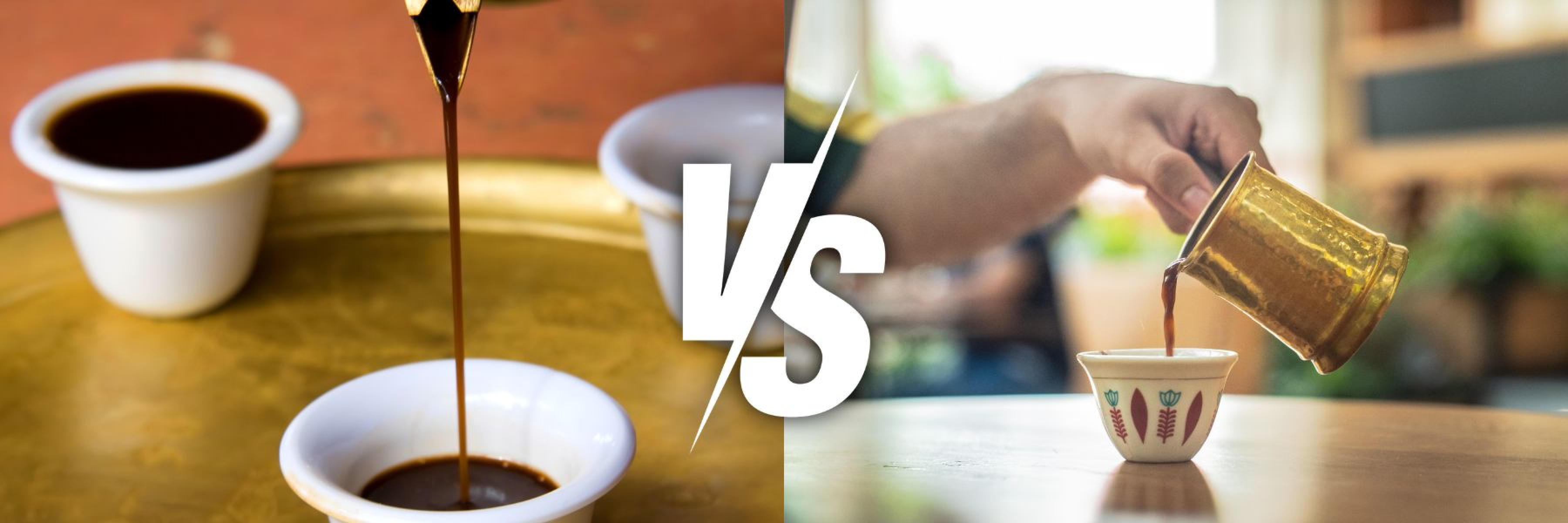Coffee lovers know that a cup of coffee isn't just a beverage—it's a ritual, a slice of culture, and sometimes, a bit of history in a cup. Today, let's explore two iconic styles that have enchanted coffee enthusiasts for centuries: Arabic and Turkish. Although they might look similar at first glance, each has its unique preparation, flavor, and cultural significance. So, grab a seat, and let’s embark on this flavorful journey!
A Glimpse into History
Arabic Coffee:

Arabic coffee, or "Qahwa," has been cherished in the Arabian Peninsula since the 15th century. It all began in Yemen, where the coffee bean first blossomed into a beverage. Over time, it spread through the Middle East, becoming an integral part of social life and hospitality in the region.
Turkish Coffee:

Fast forward a century or so, and coffee made its grand entrance into the Ottoman Empire. Turkish coffee, known as "Türk Kahvesi," soon became the heart of social gatherings in the bustling coffeehouses of Istanbul. These coffeehouses weren’t just for sipping coffee—they were vibrant hubs of conversation, storytelling, and even political debates.
The Art of Brewing
Arabic Coffee:
Coffee Beans: Arabic coffee uses lightly roasted beans, often infused with a hint of cardamom. This gives it a bright, almost golden appearance.
Preparation: The brewing process involves a "Dallah," a traditional coffee pot. Ground coffee and cardamom are added to boiling water and simmered, creating a fragrant concoction without filtration. The brew is poured directly into small, handleless cups called "Finjan."
Serving: You’ll typically find it served alongside dates or sweets, enhancing its light and aromatic profile.
Turkish Coffee:
Coffee Beans: For Turkish coffee, medium to dark roasted beans are ground to a fine powder.
Preparation: It's brewed in a "Cezve" (or "Ibrik"), a small pot. Coffee, water, and optional sugar are mixed and heated slowly until frothy. This froth is a sign of a well-prepared cup. It’s poured directly into small cups, and you drink it with the grounds, which settle at the bottom.
Serving: Often served with a glass of water and a piece of Turkish delight, making the experience sweet in more ways than one.
Savoring the Flavors
Arabic Coffee:

Flavor: The flavor of Arabic coffee is gentle and aromatic, often highlighted by the subtle spice of cardamom. In some regions, you might even find notes of saffron or rose water.
Texture: It’s light and clear, owing to the lack of grounds in the cup, making it smooth and easy to sip.
Turkish Coffee:

Flavor: Turkish coffee offers a bold, intense flavor with a rich, slightly bitter, robust, full-bodied taste.
Texture: Expect a thicker, viscous experience thanks to the fine ground in the cup, giving it a uniquely rich texture.
Cultural Tapestry
Arabic Coffee:
In Arab culture, serving coffee is a sign of hospitality, respect, and community. It’s common to see Arabic coffee served during social events, from casual gatherings to significant ceremonies. The ritual of pouring and offering coffee reflects deep-rooted traditions of generosity and warmth.
Turkish Coffee:
In Turkey, coffee isn’t just a drink; it's a cultural artifact. Turkish coffee has its proverb: "Coffee should be black as hell, strong as death, and sweet as love." Beyond the brew, there's the charming tradition of fortune-telling with coffee grounds. After finishing your cup, the patterns left behind are "read" to tell your future—adding a sprinkle of mystery to the experience.
Modern Twists
Arabic Coffee:
Today, Arabic coffee finds its place in both traditional settings and modern coffee shops. Innovations like Arabic-inspired espresso drinks or cold brews are popping up, marrying tradition with contemporary tastes.

Turkish Coffee:
Likewise, Turkish coffee has evolved beyond its classic preparation. Electric Turkish coffee makers, flavored syrups, and even Turkish coffee cocktails are becoming trendy, making this traditional brew accessible to modern palates.

Wrapping Up
Arabic and Turkish coffee offer more than just a caffeine kick—they dive deeply into rich cultural traditions and histories. Whether you’re drawn to the light, spiced elegance of Arabic coffee or the robust, full-bodied richness of Turkish coffee, each offers a unique journey for your taste buds and a glimpse into time-honored customs.
So, the next time you’re enjoying a cup, remember you’re not just drinking coffee—you’re partaking in a centuries-old ritual that brings people together.
The intricate dance of aromas and traditions in both Arabic and Turkish coffee offers a unique journey through history and flavor. With Flava's expert blends and authentic selections, you can savor the essence of these coffee cultures right in your own home. Discover your perfect brew with Flava and indulge in the heritage of each sip.




